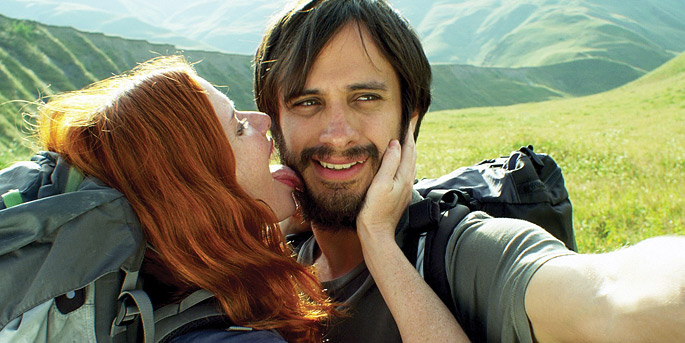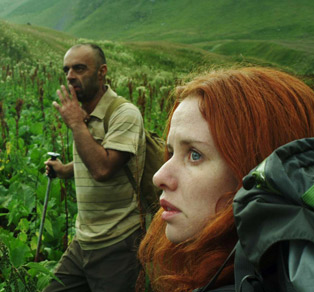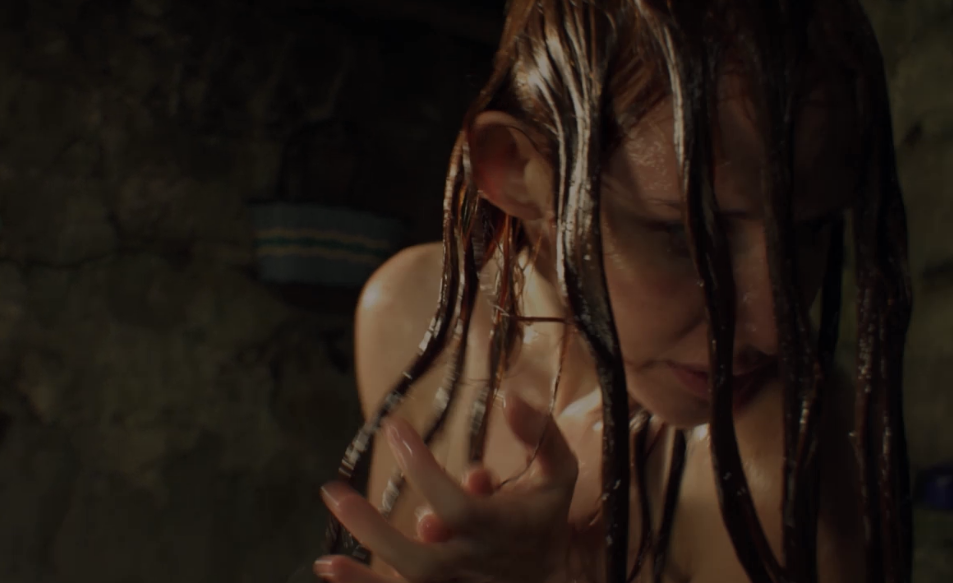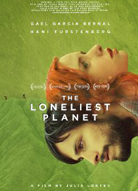The first of the senses that writer/director Julia Loktev hits us with over the opening black screen is sound. We heara rhythmic pounding/creaking/breathing that's hard to place (sex scene? construction work?). When the fade-up happens, you'd never guess what image is waiting for you. It's something both utterly mundane and alien and strange. This is only the first of the surprises that await you as you journey across the Georgian wilderness with Nica (Hani Furstenberg) and Alex (Gael García Bernal) in The Loneliest Planet.
 Hani Furstenberg could eat Gael García Bernal right up in "The Loneliest Planet"
Hani Furstenberg could eat Gael García Bernal right up in "The Loneliest Planet"
Nica and Alex are madly in love both with each other and their mutual wanderlust. They're seeking an authentic travel experience beyond touristy paths before they marry. English is their common tongue (though neither of their native languages) and the film makes the very smart decision of subtitling nothing, as they attempt to communicate with the locales and teach each other a bit of their native tongues. They sign up with a local guide Dato (Bidzina Gujabidze), the only other major character in the film, and they're off.
The Loneliest Planet ostensibly belongs to the arthouse school of contemplative "slow" films but there's actually quite a lot happening, as we observe Nica and Alex making love, absorbing nature alone or together and alternately building bonds with their guide and ignoring him. The space between each character is more geographically interesting than the landscape surrounding them. (Whether there's enough happening to justify its 113 minute running time is a separate question.)
The movies construction is such that you're climbing its mountain of details to the peak at Act One's curtain where "The Incident" takes place. And then you're climbing back down again in Act Two, with so much new to process in stunned silence. "The Incident" (which is all I'll call it and what the director herself calls it) is a frightening and confusing moment that's also utterly believable and gorgeously acted. It's rendered all the more potent by the lack of constant cutting that mars so many pictures in the editing stage. The Incident is the movie's guaranteed conversation centerpiece which I fear most reviews with their lazy insistence on plot-plot-plot will give away. Loktev's mode throughout is observational and her refusal to offer up any commentary or (non visual) point-of-view on the matter will surely be counted as a detriment for some and a plus for others. Put another way she's masterfully collecting details but whether or not she has something to say about her treasured collection remains an open question to be answered by future films.
 All movies engage your eyes and your ears by their very nature, but seize your visual and aural imagination only with skill. Loktev gently forces a third and dominant sense into the equation. Right from the very first startling image Loktev shows an extraordinary gift for the tactile. How many movies can you feel on your skin? Cold water, the brush of fingertips, a stone in one's shoe, hair violently tossing about in the wind and so many more sensations are beautifully captured. Most tellingly in The Loneliest Planet you can absolutely feel the warmth of a lover's touch and the unavoidable sudden chill whenever bodies separate. B+
All movies engage your eyes and your ears by their very nature, but seize your visual and aural imagination only with skill. Loktev gently forces a third and dominant sense into the equation. Right from the very first startling image Loktev shows an extraordinary gift for the tactile. How many movies can you feel on your skin? Cold water, the brush of fingertips, a stone in one's shoe, hair violently tossing about in the wind and so many more sensations are beautifully captured. Most tellingly in The Loneliest Planet you can absolutely feel the warmth of a lover's touch and the unavoidable sudden chill whenever bodies separate. B+
Previously @ NYFF
Melancholia - Michael gazes upon the end of the world with von Trier
 Wednesday, April 17, 2013 at 11:29PM
Wednesday, April 17, 2013 at 11:29PM 






